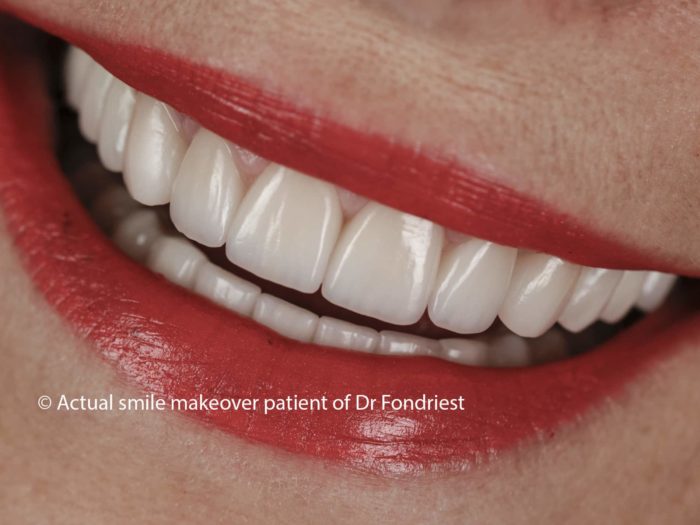
Dental implant crowns can look like real teeth. Can you tell which 5 teeth in this smile are actually implants?
If you’ve lost permanent teeth or have done any research on options for tooth replacement, you’ve probably heard of dental implants. The dental industry’s not-so-secret hidden treasure, dental implants are far and away the best method for replacing missing dentition. Dental implants offer patients several advantages over other traditional dental prosthetics. Although there are many benefits of using implants, there are also common dental implant mistakes.
Common Dental Implant Mistakes #1: Not Performing Adequate Research
It’s a simple principle: well-informed consumers make wiser decisions when it comes to the products and services they buy. Before purchasing a car, you would probably research what types of cars best suit your specific needs. You find out which dealerships have a good customer service record. You also have an idea of what you can spend. Interested patients would be smart to go through a similar process. While planning major dentistry, you will need to know:
- What can you expect from the procedure and healing process?
- How much does the procedure cost and will your insurance plan cover any part of it?
- Are there any qualified providers of in your area?
- Are there medical conditions or lifestyle factors that may affect whether you qualify for dental implants?
Once you have gathered the information you need, you can determine whether or not implants are right for you. Dr. Fondriest recommends you have a consultation with at least two dental implant dentists in your area. This will serve the dual purpose of getting to know whether you like one provider better than the other. It will help you to avoid making incorrect assumptions such as . . .
Mistake #2: Assuming You Don’t Qualify for Dental Implants
A few basic internet searches will yield a wealth of general information about dental implants and who qualifies for them. Much of the online information is not specific. It will give you generalized information. For instance, in general, people with reduced jawbone density, chronic illnesses like diabetes or heart disease, or people with poor oral hygiene or who smoke or chew tobacco products do not qualify for dental implants. However, these circumstances do not absolutely take you out of the running for implants.
If you have a pre-existing medical condition or a lifestyle factor that might affect your chances, schedule a consultation. Find two respected providers to consult with. Confirming your plan with another opinion is worth the time.
In some cases, an auxiliary procedure, such as a bone graft, can help you qualify. In other cases, lifestyle changes such as quitting smoking or taking consistent care of your teeth and gums might help you qualify for dental implants.
Dental Implant Mistake #3: Falling for Offers that are Too Good to be True
Fast implants! Discount implants! As you research your options, you may run across some offers that seem to promise amazing results in half the time and at half the cost. Unfortunately, when it comes to implants, if the offer seems too good to be true, it probably is. In reality, dental implants are expensive and the procedure is lengthy. If a provider promises to slash costs or dramatically reduce the time involved, you can almost bet that they are compromising quality of care. Opting for cheap and fast can result in a higher risk of complications. Complications include implant failures, loosened or ill-fitting dentures, and pain.
Locate a provider you trust. If cost is an issue, most reputable implant and restorative dentists offer flexible financing options. They often also work with third-party financing companies who can accommodate your budget. If the length of treatment is an issue, try and take the long view. Dental implants take several months to complete. When it is all done, you’ll be able to enjoy a healthy, functional, and beautiful smile for years and years.
Using dental implants in the mouth
Improved stability.
Dental implants do not slip, fall out, or require the use of adhesives.
Longer lasting tooth replacement.
When properly placed and taken care of, they can last well over 20 years.
Improved chewing ability.
For instance, implant-retained dentures restore about 80-90% of a patient’s chewing ability as opposed to a mere 10-20% restored ability with traditional removable dentures.
Improved bone health.
Dental implants stimulate the bone just like a natural tooth root would. This jawbone stimulation results in the maintenance of healthy bone density.
Clearly, dental implants provide an ideal solution to adult tooth loss. That being said, there are some mistakes or assumptions that patients make along the way. These mistakes can significantly impact the success of your implants. Today, Dr. James Fondriest discusses a few common mistakes consumers make when considering dental implants and how to avoid them.
Learn more about Common Dental Implant Mistakes
To schedule a consultation and learn if dental implants are right for you, contact us at (847) 234-0517. Dr. James Fondriest is a respected regional authority on restorative dentistry and prosthodontics. He works with a team of qualified oral surgeons and periodontists to deliver the highest quality available. Our dentist office proudly serves patients from the North Shore suburbs of Chicago, including Winnetka.
